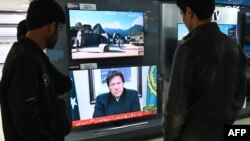Pakistan’s prime minister, Imran Khan, has authorized his military forces to immediately respond to “any aggression” against the country by India, officials said Thursday.
The move underscored a dangerous escalation in tensions between the two nuclear-armed rival nations in the wake of last week’s deadly car bombing of an Indian paramilitary convoy in the disputed Kashmir region.
A Pakistan-based militant group known as Jaish-e-Mohammad has reportedly claimed responsibly for the violence that killed more than 40 security forces in Pulwama district.
New Delhi has vowed to punish Islamabad for sheltering the militants, saying the Indian army chief has been given a “free hand” to take whatever action was required.
Pakistan rejects Indian charges of playing a role in the February 13 attack and maintains the militant group has long been outlawed as part of counter-extremism measures.
The Indian military threat has fueled mutual tensions and prompted Khan to convene an emergency meeting Thursday of top civilian and military leaders to assess the situation, officials said.
“The prime minister authorized armed forces of Pakistan to respond decisively and comprehensively to any aggression or misadventure by India,” according to a statement issued after the National Security Committee meeting.
The forum, it noted, again cautioned India against linking the Pakistani state to what it said was a condemnable incident and reiterated Islamabad’s offer of cooperation in investigating it.
“We expect India to positively respond to the offers. Based on the investigation or any tangible evidence provided, state of Pakistan shall take action against anyone found using our soil,” the statement said.
India has severed already-limited trade links with Pakistan and suspended the only bus service for divided Kashmiri families in the Himalayan region, which has caused two of the three wars between the two countries.
New Delhi and Islamabad have equipped their militaries with nuclear weapons since they last went to war in 1971, raising fears another conflict could escalate into a nuclear exchange.
A separate statement issued by the Pakistani Interior Minister said that the NSC meeting also decided to ban two controversial Islamic charities linked to the radical cleric, Hafiz Saeed, who India accuses of masterminding the 2008 Mumbai attacks.
The charities, known as Jamaat-ud-Dawa (Jud) and Falah-e-Inasaniyat Foundation (FIF), are allegedly fronts for the militant group Lashkar-e-Taiba (Let) that New Delhi says was behind the three-day carnage in the Indian financial capital, which left 166 people dead, including Americans. Until now, the two groups had been placed on a government terror watch list.
The move is being seen as an attempt to defuse tensions with India, though there was no immediate response from New Delhi.
Washington has offered $10 million for bringing to justice Saeed for the Mumbai attacks. Saeed lives freely in Pakistan because authorities say there is no solid evidence linking him to Mumbai attacks.
The U.S. has already outlawed LeT along with JuD and FIF as foreign terrorist organizations.
India has severed already-limited trade links with Pakistan and suspended the only bus service for divided Kashmiri families in the Himalayan region, which has caused two of the three wars between the two countries.
New Delhi and Islamabad have equipped their militaries with nuclear weapons since they last went to war in 1971, raising fears another conflict could escalate into a nuclear exchange.





